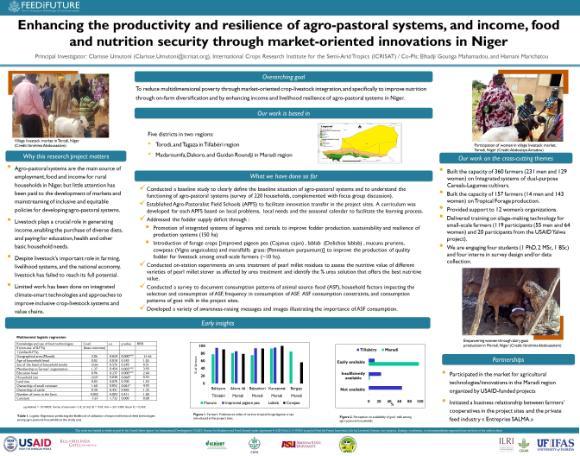Enhancing the Productivity and Resilience of Agro-pastoral Systems, and Income, Food and Nutrition Security Through Market-Oriented Innovations in Niger
- Research Project Location: Niger
- Timeframe: September 2022 - September 2025 (Terminated in February 2025)
- Funding: USAID
Introduction
Despite the important role of livestock in the farming and livelihood systems and the national economy, livestock has failed to reach its full potential in Niger. Limited work has been done on integrated climate-smart technologies and approaches to improve inclusive crop-livestock systems and value chains, increase incomes, reduce multidimensional poverty, and improve nutrition and health. This project aimed to reduce multidimensional poverty through market-oriented crop-livestock integration, and specifically to improve nutrition through on-farm diversification and by enhancing income and livelihood resilience of agro-pastoral systems in Niger.
Project Objectives
Objectives of the project were to:
- Identify entry points for promoting and enabling productive, resilient, climate-smart and sustainable agro-pastoralist systems.
- Increase livestock productivity through development of climate-smart feed systems.
- Identify and promote evidence-based strategies for development of markets and inclusive value chains of small livestock and goat milk for improving household income and nutrition.
- Improve household nutrition through greater consumption of animal-source foods and diverse diets.
Background
Agropastoral systems in Niger have limited productivity due to low market performance and the inability of markets to meet seasonal demands. By providing on-farm diversification and creating business opportunities around crop-livestock value chains, agropastoral systems and livelihoods can become more resilient.
Research Approach
Both Innovation Platform and (Agro) Pastoralist Field School (PFS) will be the main approaches to help the project achieve its goal. PFS’s will be used as centers where actors can easily access technology and best practices, information, services, indigenous knowledge, and the introduction and scaling up of new technologies and innovations. This platform will serve as a bridge for transforming the mindset of PFS members following this action-learning process, shifting from a focus on subsistence or survival to a more business-oriented attitude. PFS’s will promote a more client-oriented approach to extension services with a view to building communities that are more resilient to disasters through improved community planning and action. PFS’s show promising evidence of the enhanced ability of men and women to make informed decisions about their livelihoods and become the agents of change.
Principal Investigator (PI) and lead institution

Clarisse Umutoni, International Crops Research Institute for the Semi-Arid Tropics (ICRISAT)
Additional collaborators
- Dan Dicko Dankoulodo University of Maradi
- University Abdou Moumouni
- Amate Seed Farm
- Ainoma Seed Farm
- Association for the Promotion of Livestock in the Sahel and Savannah (Association pour la Promotion de l’Elevage au Sahel et en Savane [APESS]).
- Arizona State University
- Cultivating New Frontiers in Agriculture (CNFA)
Resources

News: Farm project in Niger set to harness the synergies between crops and livestock
Project Flyer (English): Enhancing the productivity and resilience of agro-pastoral systems
Project Flyer (French): Améliorer la productivité et la résilience des systèmes agropastoraux





